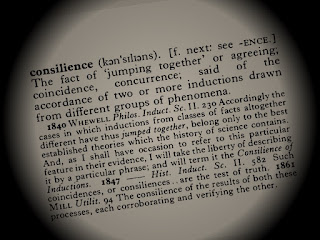The first place I turned to was the "Shorter" Oxford English Dictionary (all 20 volumes of it), where I found on p. 772:
consilience (kan'silians). [f. next: see -ence.] The fact of ‘jumping together’ or agreeing; coincidence, concurrence; said of the accordance of two or more inductions drawn from different groups of phenomena. 1840 Whewell Philos. Induct. Sc. II. 230 Accordingly the cases in which inductions from classes of facts altogether different have thus jumped together, belong only to the best established theories which the history of science contains. And, as I shall have occasion to refer to this particular feature in their evidence, I will take the liberty of describing it by a particular phrase; and will term it the Consilience of Inductions. 1847 - Hist. Induct. Sc. II. 582 Such coincidences, or consiliences .. are the test of truth. 1861 Mill Utilit. 94 The consilience of the results of both these processes, each corroborating and verifying the other.
That sounded to me like the conflation, or intersectionality of ideas. That different fields may have cross-over points like a Venn diagram. However, there has also been a text written on this topic, so I turned to that, which suggested that the pursuit of science was like "Preferring a search for objective reality over revelation" and that, unlike religion, academe "aims to save the spirit, not by surrender but by liberation of the human mind. Its central tenet, as Einstein knew, is the unification of knowledge. When we have unified enough certain knowledge, we will understand who we are and why we are here" (Wilson, 1998, p. 14). Still sounding like conflation or intersectionality to me.
I pushed on, and found a definition of consilience as a "'jumping together' of knowledge by the linking of facts and fact-based theory across disciplines to create a common groundwork of explanation" (Wilson, 1998, p. 17, citing Whewell, 1840). Sounding more like intersectionality now.
However, a clearer explanation is provided, which I found interesting:
That consilience can be defined as: "Units and processes of a discipline that conform with solidly verified knowledge in other disciplines have proven consistently superior in theory and practice to units and processes that do not conform" (Wilson, 1998, p. 368).
OK. So more than intersectionality. Consilience is where pan-field laws sweep narrow field definitions away, with revolutionary sense-making utility. Like the positional-shift in the Earth being spherical (if we keep going West we get to the East; which changed astronomy, navigation, earth sciences, weather, and ship-building). Like germ science (bugs make us sick, not bad air; leading to hygiene, lower mortality in surgery, microbiology, epidemiology, vaccination...). Like DNA (heritability is more pervasive than we thought; creating new sciences cross-overs such as nutrigenomics, recombinant memetics; Dvorksy, 2013).
I am not sure how that affects career practice, management or leadership... but perhaps this is where new understandings in psychology or neurology may cross-over into all three of these areas...
Something to think about.
Sam
References:
Brabazon, T. (26 August 2022). The Post 023 - Battery Hen Farmer Supervisor [video]. https://youtu.be/xPx7RDr0E5Y
Dvorsky, G. (27 February 2013). 11 Emerging Scientific Fields That Everyone Should Know About. https://gizmodo.com/11-emerging-scientific-fields-that-everyone-should-know-5987296
Simpson, J. A., & Weiner, E. S. C. (Eds.) (1989). Oxford English Dictionary (2nd ed., Vol III Cham-Creeky). Clarendon Press.
Wilson, E. O. (1998). Consilience: The unity of knowledge. Alfred Knopf.


No comments :
Post a Comment
Thanks for your feedback. The elves will post it shortly.